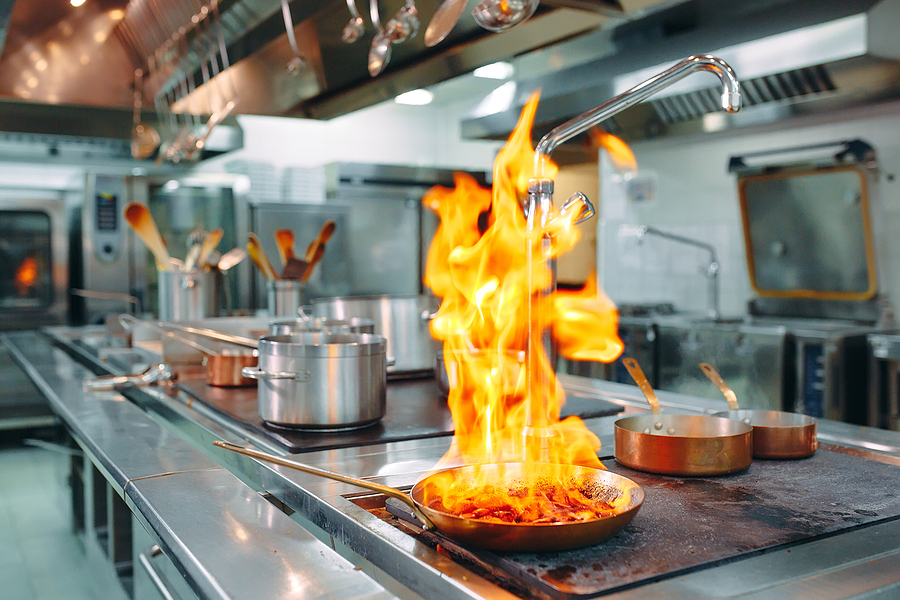To protect its employees and clients, fire safety is critically important for restaurants. Fires in restaurants can be disastrous. This article covers some of the most critical fire safety strategies that restaurant owners must put in place to minimize risks and ensure preparedness for emergencies.
Install Smoke Detectors
Smoke detectors are vital in early detection of fire. Cooking areas, storerooms, breakrooms, among other areas require placing smoke detectors in them. The interconnected detectors should be such that once one goes off, all will alarm thus notifying the occupants. Regular replacement of the smoke detector batteries is necessary.
Keep Fire Extinguishers Accessible
In controlling fires before they spread extensively, easy access to fire extinguishers is very important. Kitchen storage, break room and dining sections are suitable places where appropriate fire extinguishers can be placed within a restaurant’s premises. The staff should be trained on how to use different types of extinguishers for electrical fires or oil or grease fires while cooking food.
Inspect Cooking Equipment Daily
Cooking equipment is a major fire hazard in restaurants. Stovetops, ovens, grills and fryers should be inspected daily and maintained properly to prevent equipment defects. Any gas leaks, damaged wiring or oil buildup must be addressed immediately. Proper cleaning and maintenance of cooking appliances reduce risks.
Provide Employee Fire Safety Training
Employees play a critical role in fire prevention and response. Restaurants need to train staff on preventing kitchen hazards, using extinguishers and evacuation protocols. Periodic fire drills will prepare them to assist customers to exit safely during emergencies. Proper training empowers employees to take appropriate actions when fires occur.
Maintain a Clean, Organized Kitchen
Cluttered, greasy kitchens are fire risks. Appliances should be kept free of grease through daily cleaning. Flammable oils and spirits need storage away from heat sources. Frequent trash removal prevents accumulation of combustibles. An orderly kitchen with good housekeeping is safer.
Install a Commercial Kitchen Fire Suppression System
A specialized kitchen fire suppression system detects fires and releases water or chemicals to control and extinguish them quickly. This minimizes fire damage in kitchens. Though expensive, it provides 24/7 monitoring and instant firefighting capabilities when hazards occur. The system activates automatically even when kitchens are unoccupied.
Inspect Electrical Systems
Faulty electrical wiring and outlets often spark fires. All electrical installations should meet building codes and be inspected for damage. High power kitchen appliances need proper dedicated outlets. Avoid extension cords and overloaded outlets which can overheat. Any electrical issues need immediate correction to minimize risks.
Create a Fire Emergency Response Plan
Restaurant managers should develop emergency response plans emphasizing fire safety procedures. Employees need compliance training and preparation to act quickly and appropriately during crises. Everyone should understand their specific roles and responsibilities. Practicing the procedures through regular fire drills is essential. Detailed planning and training enable effective response to real emergencies.
Schedule Regular Fire Inspections
Routine professional fire safety inspections are vital. They ensure early detection from properly installed and maintained smoke detectors. Extinguishers are checked for functionality. Cooking equipment, electrical systems and fire suppression systems are scrutinized for hazards. Taking proactive preventive measures enhances restaurant fire safety for all occupants.
Conclusion
Restaurant fires endanger lives and cause massive damage. Implementing smoke detectors, fire extinguishers, kitchen fire suppression systems, and electrical inspections reduces risks. Employee training and detailed emergency planning also improve fire safety. Following these critical strategies makes restaurants far safer.
